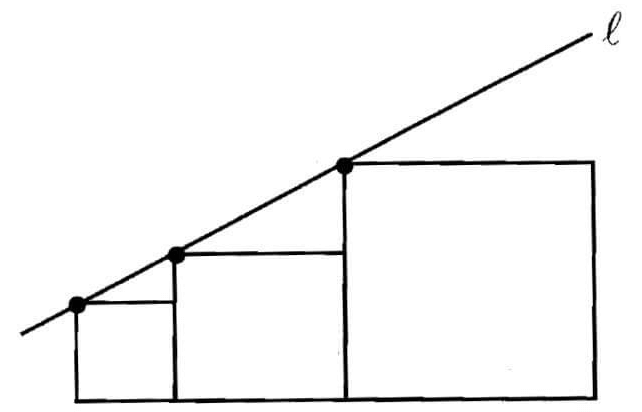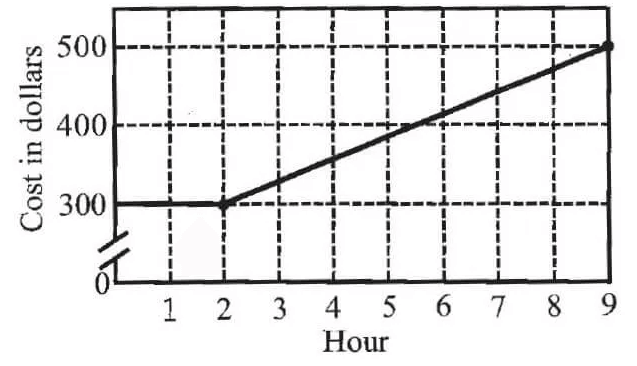PRACTICAL PROBLEMS USING PYTHAGOREAN THEOREM
Problem 1 :
5 m long ladder is placed leaning towards a vertical wall such that it reaches the wall at a point 4 m high. If the foot of the ladder is moved 1.6 m towards the wall, then find the distance by which the top of the ladder would slide upwards on the wall.
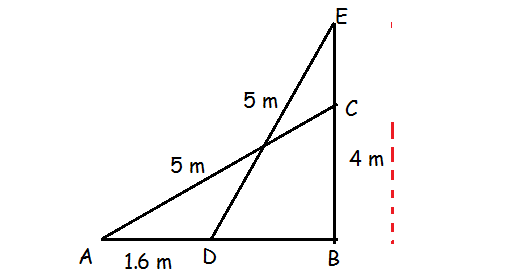
Solution :
In triangle ABC,
AC2 = AB2 + BC2
52 = AB2 + 42
AB2 = 25 - 16
AB2 = 9
AB = 3
DB = AB - AD
DB = 3 - 1.6
DB = 1.4
In triangle DBE,
ED2 = EB2 + DB2
52 = EB2 + (1.4)2
EB2 = 25 - 1.96
EB = √23.04
EB = 4.8
EC = EB - BC
= 4.8 - 4
EC = 0.8 m
So, the required distance is 0.8 m.
Problem 2 :
The perpendicular PS on the base QR of a triangle PQR intersects QR at S, such that QS = 3 SR. Prove that 2PQ2 = 2PR2 + QR2
Solution :
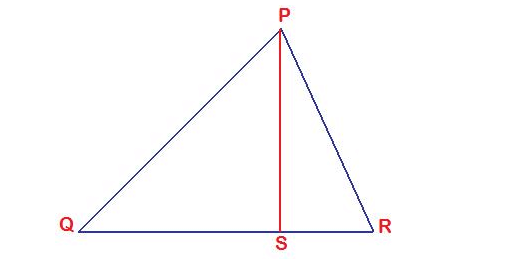
QR = QS + RS
QR = 3RS + RS
QR = 4RS
RS = QR/4
By applying Pythagorean theorem in a triangle PQS, we get
PQ2 = PS2 + QS2
PS2 = PQ2 - QS2 -----(1)
By applying Pythagorean theorem in a triangle PRS, we get
PR2 = PS2 + SR2
PS2 = PR2 - SR2 -----(2)
PQ2 - QS2 = PR2 - SR2
PQ2 - QS2 = PR2 - SR2
PQ2 = PR2 - SR2 + QS2
PQ2 = PR2 - SR2 + (QR - RS)2
PQ2 = PR2 - SR2 + QR2 + RS2 - 2QR x RS
PQ2 = PR2 + QR2 - 2QR x RS
PQ2 = PR2 + QR2 - 2 QR x (QR/4)
PQ2 = PR2 + QR2 - (QR2/2)
PQ2 = (2PR2 + 2QR2 - QR2)/2
2PQ2 = 2PR2 + QR2
Problem 3 :
In the adjacent figure, ABC is a right angled triangle with right angle at B and points D, E trisect BC. Prove that 8AE2 = 3AC2 + 5AD2
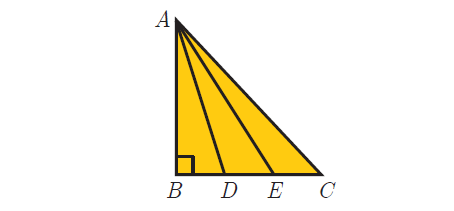
Solution :
AE2 = AB2 + (2x)2
AE2 = AB2 + 4x2
In Δ ABC,
AC2 = AB2 + BC2
AC2 = AB + (3x)2
AC2 = AB2 + 9x2
Now,
3AC2 + 5AD2 = 3(AB2 + 9x2) + 5(AB2 + x2)
= 8AB2 + 32x2
= 8(AB2 + 4x2)
= 8AE2
8AE2 = 3AC2 + 5AD2
Hence proved.
Kindly mail your feedback to v4formath@gmail.com
We always appreciate your feedback.
©All rights reserved. onlinemath4all.com
Recent Articles
-
Digital SAT Math Problems and Solutions (Part - 146)
Apr 18, 25 06:52 AM
Digital SAT Math Problems and Solutions (Part - 146) -
Logarithmic Derivative Problems and Solutions
Apr 16, 25 09:25 PM
Logarithmic Derivative Problems and Solutions -
Digital SAT Math Problems and Solutions (Part - 145)
Apr 16, 25 12:35 PM
Digital SAT Math Problems and Solutions (Part - 145)
